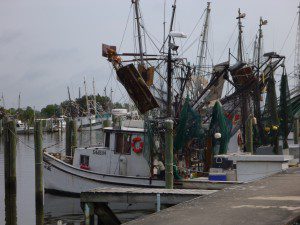Rob Diaz de Villegas WFSU-TV
 Last Thursday, WFSU-FM’s Perspectives welcomed four guests to talk about Rivertrek 2011: Earl Morrogh, the event’s coordinator; Dan Tonsmeire of the Apalachicola Riverkeeper; Georgia Ackerman of the Wilderness Way; and Doug Alderson, who we remember as Florida’s coordinator for paddling trails. If you don’t remember, here’s a link to the video for which we interviewed him on the Florida Circumnavigational Saltwater Paddling Trail. Rivertrek, much like that trail, is a five day paddling/ camping trip. The ten paddlers setting out on Wednesday are not beginners.
Last Thursday, WFSU-FM’s Perspectives welcomed four guests to talk about Rivertrek 2011: Earl Morrogh, the event’s coordinator; Dan Tonsmeire of the Apalachicola Riverkeeper; Georgia Ackerman of the Wilderness Way; and Doug Alderson, who we remember as Florida’s coordinator for paddling trails. If you don’t remember, here’s a link to the video for which we interviewed him on the Florida Circumnavigational Saltwater Paddling Trail. Rivertrek, much like that trail, is a five day paddling/ camping trip. The ten paddlers setting out on Wednesday are not beginners.
Click here to listen to an audio archive of last Thursday’s Perspectives.
 So, after spending over a year dealing with saltwater habitats, why are we talking about freshwater bodies of water? It has to do with that connectedness we see over and over again. Salt marshes and oyster reefs benefit each other. Some fish and shrimp species spend their younger years in these coastal habitats before heading out to deeper waters. And without the Apalachicola River’s constant flow of fresh water, Apalachicola Bay would be too salty to sustain healthy oyster reefs. This would affect not only the oyster fishery, but the species that use the reefs as a habitat (many of which are in turn commercially and recreationally fished). Oyster filtration as an ecosystem service would also be endangered, affecting local seagrass beds and the species they support.
So, after spending over a year dealing with saltwater habitats, why are we talking about freshwater bodies of water? It has to do with that connectedness we see over and over again. Salt marshes and oyster reefs benefit each other. Some fish and shrimp species spend their younger years in these coastal habitats before heading out to deeper waters. And without the Apalachicola River’s constant flow of fresh water, Apalachicola Bay would be too salty to sustain healthy oyster reefs. This would affect not only the oyster fishery, but the species that use the reefs as a habitat (many of which are in turn commercially and recreationally fished). Oyster filtration as an ecosystem service would also be endangered, affecting local seagrass beds and the species they support.
Of course, the river itself supports a lot of biodiversity- 1,500 plant and animal species make their home on the river basin. That includes over forty species of amphibians and 80 species of reptiles. That’s why these paddlers are trying to raise awareness for this river, and fighting to prevent development long it.
For more information, visit the Rivertrek 2011 web site.
